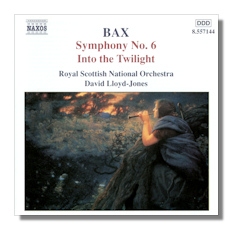
The Internet's Premier Classical Music Source
Related Links
- Bax Reviews
- Latest Reviews
- More Reviews
-
By Composer
-
Collections
DVD & Blu-ray
Books
Concert Reviews
Articles/Interviews
Software
Audio
Search Amazon
Recommended Links
Site News
 CD Review
CD Review
Arnold Bax

Symphony #6
- Symphony #6
- Into the Twilight
- Summer Music
Royal Scottish National Orchestra/David Lloyd-Jones
Naxos 8.557144 DDD 57:29
Arnold Bax (1883-1953) is one of those English composers who don't always "travel well." In the United States, for example, his music is infrequently programmed by classical radio stations, and even more infrequently by symphony orchestras. Up until recently, Chandos held the aces in the Bax CD discography, with excellent recordings of all the symphonies and tone poems led by Bryden Thomson. Chandos CDs are relatively expensive, however, and there is plenty of room for this ongoing budget Naxos series with David Lloyd-Jones.
The Sixth Symphony (1935), Bax's penultimate work in this genre, is one of the strongest. This composer seldom achieved a distinctive sound, but he blended many influences together in a distinctive way. The symphony bears many echoes of Delius and some of Sibelius (who admired Bax greatly), and also intriguing anticipations of Bernard Herrmann and Franz Waxman! The mood, while pastoral, is not necessarily peaceful, and the Sixth Symphony goes through many an unsettled patch – apparently inspired by the Scottish seacoast - before reaching its quiet but emotionally unresolved ending. Bax has been described as both a Romantic and an Impressionist, and that description certainly holds true in the Sixth Symphony.
Into the Twilight is a much earlier work, dating from the composer's mid-twenties. It is based on sketches for an aborted opera based on the Irish legend of Deirdre of the Sorrows. Highly atmospheric, it depicts, according to the composer, "something of the sense of timelessness and hypnotic dream which veils Ireland" as day turns into night. Summer Music (1921, rev. 1932) shimmers in the noonday heat. (Yes, even in England!) Here, Bax's Delian leanings become almost explicit, with a near-quotation of the older composer's "Walk to the Paradise Garden" from A Village Roméo and Juliet.
The Royal Scottish National Orchestra, at least as it has been recorded here, lacks ideally opulent strings, but Lloyd-Jones's apparent preference for a more transparent sound makes his readings a viable alternative to Thomson's. Lloyd-Jones will suit people who want a more Romantic Bax; Thomson is for those who favor Bax's Impressionism. Both conductors have something to offer. Naxos deserves praise, however, for making Bax more accessible to the merely curious.
Copyright © 2003, Raymond Tuttle


















